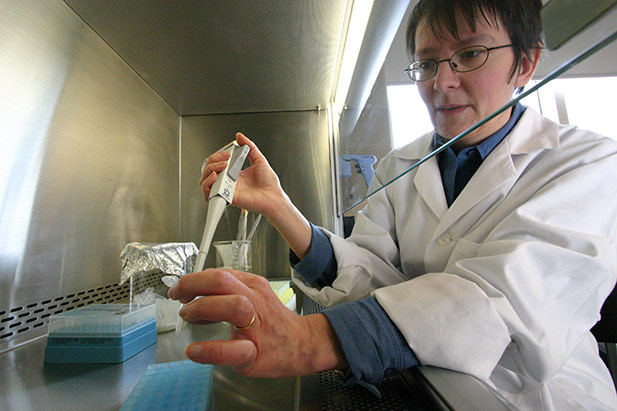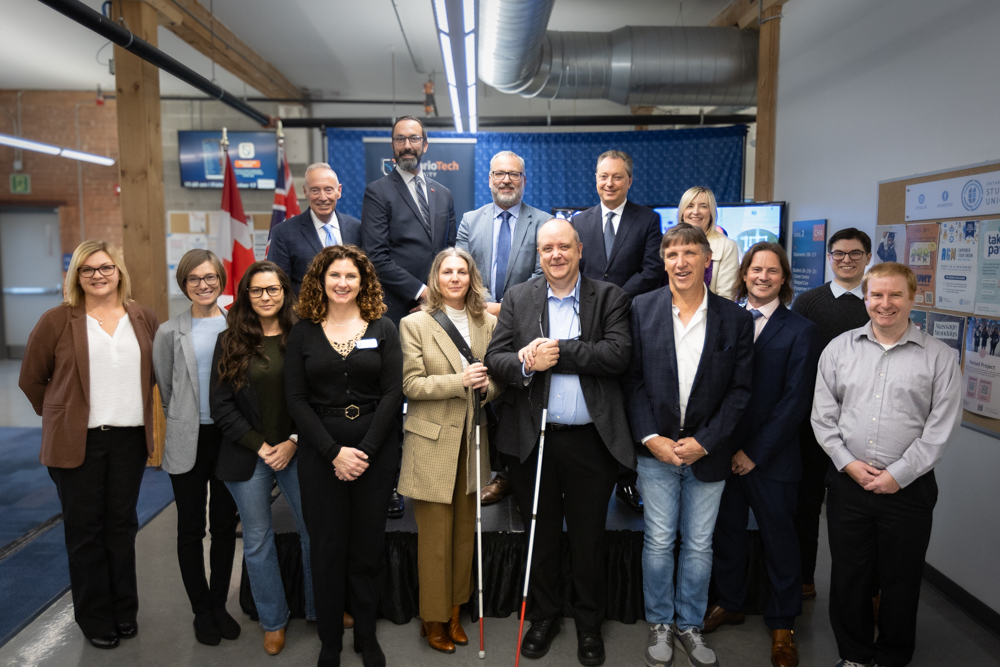New federal funding to drive innovative university research projects
Nearly two dozen researchers will share more than $2.2 million in funding
September 8, 2017

Food impact on the immune system, information privacy, security analytics, and the use of big data to predict disease onset are among many themes highlighting new funding for innovative research at the University of Ontario Institute of Technology.
The Natural Sciences and Engineering Research Council of Canada (NSERC) will provide more than $2.2 million in grants to 21 researchers and their project co-applicants at the university.
The Honourable Kirsty Duncan, Minister of Science made the national NSERC announcement September 8 at the University of Victoria in British Columbia.
NSERC Research Tools and Instruments Grants
Faculty of Science
- Brad Easton, PhD: Replacement scanning electron microscope for materials chemistry research
NSERC Discovery Grants–Individual
Faculty of Business and Information Technology
- Andrew Hogue, PhD: Fundamental challenges in user experience modelling for immersive technologies
- Stephen Marsh, PhD: Information transparency for privacy through trust
Faculty of Energy Systems and Nuclear Science
- Matthew Kaye, PhD: Materials chemistry applications that support the nuclear industry
- Markus Piro, PhD: Thermodynamic investigations to enhance materials performance for manufacturing and energy systems applications
Faculty of Engineering and Applied Science
- Ibrahim Dincer, PhD: Novel integrated solar energy systems for multigeneration
- Haoxiang Lang, PhD: Research and development of visual perception and manipulation in an interactive autonomous robotic system
- Ghaus Rizvi, PhD: Innovative production of composites with plane alignment of fibres
- Shahram ShahbazPanahi, PhD: Resource allocation for active channels
- Ying Wang, PhD: Intelligent modelling and design of medium-to-large scale microwave and millimetre-wave circuits for communication systems
- Sheldon Williamson, PhD: Design and development of a high-efficiency wireless fast-charging system for urban modes of autonomous electric mobility and transportation
- Mohammed Youssef, PhD: Innovative power electronics components, control systems, and motor design techniques for future smart power drive systems
Faculty of Health Sciences
- Paul Yielder, PhD: Influence of altered sensory input and cortical asymmetry on movement-induced plasticity
Faculty of Science (FSCI)
- Julia Green-Johnson, PhD: Understanding the impact of food components and microbial metabolites on interactions of gut microbes with the immune system
- Ken Pu, PhD: Managing constraints as data
- Liliana Trevani, PhD: Advanced materials and characterization tools for energy conversion and storage
NSERC Discovery Development Grants
Faculty of Business and Information Technology
- Khalil El-Khatib, PhD: An integrated framework for security analytics for the digital age
- Fletcher Lu, PhD: Active optimal control in health insurance
Faculty of Energy Systems and Nuclear Science
- Rachid Machrafi, PhD: Exploring fundamental proprieties of multi-element scintillators in complex terrestrial and space radiation fields
Faculty of Engineering and Applied Science
- Mikael Eklund, PhD: Scalable, real-time predictive modelling methods using multi-rate physiological time series data for the prediction of disease onset
- Yuping He, PhD: Design optimization of multi-trailer articulated heavy vehicles with driver-adaptive and co-ordinated active safety systems
NSERC also awarded the University of Ontario Institute of Technology four Canada Graduate Scholarships (for students currently enrolled in master’s programs).
Quotes
“The NSERC Discovery programs provide invaluable support for leading-edge and fundamental research at the University of Ontario Institute of Technology. We are proud of the creativity and innovation of our professors and look forward to the discoveries and new knowledge they will generate to meet the challenges of today and tomorrow.”
—Douglas Holdway, PhD, Vice-President, Research, Innovation and International (Interim)
“The Government of Canada is committed to investing in fundamental research and engineering that will improve and enrich our country’s knowledge economy. We believe in encouraging scientists’ cutting-edge ideas that will lead Canada to greater social and economic growth. I am particularly proud of the support offered to postgraduate students and postdoctoral fellows who, thanks to today’s investment, will be exposed to advanced training experiences that will prepare them for the jobs and opportunities of tomorrow.”
—The Honourable Kirsty Duncan, Minister of Science
“At the core of every research project, every laboratory and every discovery, there are people. NSERC empowers these people to build an innovative, prosperous and inclusive society. NSERC Discovery Grants, scholarships and fellowships provide thousands of top researchers, students and fellows with the foundation they need to concretize their research ambitions and explore the unknown.”
—Dr. B. Mario Pinto, President, NSERC
Quick facts
- NSERC is investing $515 million nationally in Discovery Grants, graduate and postgraduate scholarships and postdoctoral fellowships.
- $368 million in support will go to NSERC’s flagship Discovery Grants Program to foster research excellence in the full range of science and engineering disciplines, from biology and chemistry to advanced materials engineering and astrophysics. These grants, which are subject to rigorous quality assurance, support ongoing research programs with long-term goals and build the foundation for innovation.
- An investment of close to $86 million in Scholarship and Fellowships will launch a new generation of scientists and engineers who are at the early stages of their research careers, with support at levels of study from graduate to postdoctoral.
- Researchers will share an additional $36 million in Research Tools and Instruments Grants to purchase new research equipment needed for world-leading discovery, innovation and training.
- NSERC is also providing $15 million for resources to selected researchers to accelerate progress and maximize the impact of their promising research proposals through the Discovery Accelerator Supplements Program. At small universities, 54 researchers will receive Discovery Development Grants, totalling $1,080,000, to support their research.
Related links:
- University’s Office of Research Services website
- Federal NSERC news release
- A Vision of NSERC in 2020
Media contact
Communications and Marketing
University of Ontario Institute of Technology
905.721.8668 ext.6709
289.928.3653 (cell)
communications@ontariotechu.ca



